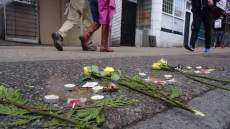OTTAWA — The Conservative government is counting on private sponsorship to ensure that the 10,000 Syrian refugees it has promised to accept between now and next September will be first and foremost Christians, Druze, Kurds and other minorities it wishes to prioritize.
However, this strategy has already failed the federal government once, when the goal was much less ambitious.
When the government first committed to accepting 1,300 Syrian refugees, only 200 were supposed to have been government-assisted. However, Canada ended up more than doubling that number and sponsoring 434 refugees when not enough private sponsors came forward quickly enough.
These 434 were referred by the United Nations Refugee Agency (UNHCR) and therefore were not selected based on religion or ethnicity.
The UNHCR has specific criteria when it comes to prioritizing certain refugees for resettlement outside the country where they first seek asylum. Their religious and ethnic backgrounds are not considered — unless these backgrounds put the refugees at risk in the country where they are seeking asylum, not the country they fled.
The Syrian refugees who are candidates to come to Canada come mainly from Libya, Jordan and Turkey, three countries that count a good number of Christians, Druze and Kurds among their refugee populations.
Since raising the target to 10,000 Syrian refugees between now and September 2016, Prime Minister Stephen Harper often repeats his government's commitment to prioritize "the most vulnerable ... especially religious and ethnic minorities."
Since the UNHCR cannot selectively send these groups Canada, the government is turning to churches.
"Canada has a unique ability to zero in on certain groups that face special persecution through its private sponsorship system," Immigration Minister Chris Alexander said Friday, referring to "church groups" and "community groups" in particular.
"We look forward to ... expanding the number of sponsorship agreement holders in response to those needs," he said, referring to the need to prioritize certain groups of Syrian refugees.
These sponsorship agreement holders are mainly religious or community groups who have pledged to sponsor refugees or help find them sponsors.
In the case of Syrian refugees, it has been mainly churches — in particular the Armenian Church — that have been the most active private sponsors.
"Maybe the government looked at this and concluded it was churches who are best organized to do private sponsorship. Thus, since the government is putting emphasis on ... private sponsorship rather than UNHCR refugees sponsored by the government, maybe they told themselves, 'They're mostly Christians,'" suggested Janet Dench, executive director of the Canadian Council for Refugees (CCR).
Last December, the CCR and other organizations denounced Ottawa's intention to privilege certain refugees on the basis of religion.
"This type of practice runs counter to fundamental principles of refugee protection," said CCR president Loly Rico. "The refugees must be selected for resettlement on the basis of need."
Sources told The Canadian Press that the government's choice to prioritize Syrian religious minorities was met with some resistance before it was announced.
Now, Alexander firmly defends the choice.
"They deserve our protection. Many of them are here already," he said. "Yazidis, various Christian groups of all denominations, Muslim minorities that are extremely endangered, persecuted by ISIS. Canada owes them the recognition that they are facing special forms of persecution and abuse."
As of Sept. 8, Canada had received 1,106 of the 10,000 Syrian refugees promised by next September. Of that number, 888 made their way to Canada as a result of private sponsorship.
To reach the target in less than a year, it will take 10 times that number. It is difficult to guess whether the churches and other community groups can keep pace.
"If an established group decides to sponsor a Muslim, nothing in the law allows the government to not take up the file or to refuse it because the person is the wrong religion," said Dench.


